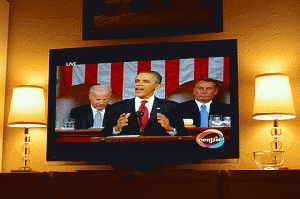(Article changed on February 1, 2014 at 12:43)
On Wedn esday, January 20, 2014, Ezra Klein spoke at Drew University in Madison, New Jersey, as their guest lecturer. Ezra Klein is a journalist, blogger (Wonk Blog), political analyst and occasional guest star on MSNBC's news opinion shows. At age 29 he is one of the most influential journalists in Washington, and he is currently creating his own internet news organization in collaboration with Vox Media.
Klein focused his remarks on the broad structures of modern American politics that explain the context for President Obama's State of the Union address the night before. The President's address, he started, was notable for what it didn't contain. It didn't contain any reference to getting any big new initiatives passed in Congress. President Obama has conceded that anything he proposes would be blocked from passage. Instead, Obama proposed plans to accomplish what he can through executive orders. He is using, and perhaps expanding his executive powers. The other remarkable feature of the President's address was the specificity and scope of these executive plans. Klein spoke to both of these issues.
By objective measures, according to Klein, the U.S. Congress is the most polarized it has been in a long time. He pointed out that polarization is not synonymous with rancorous debates or disagreements. Polarization is a measure of the overlap between two political parties, the less overlap, the greater the polarization. He pointed out that in the 1950's and early '60's the Democratic party was comprised of moderates, liberals from the North and conservatives from the South. The Republican party was also a blend of conservatives, liberals and moderates. Under these conditions there were pitched debates both between and within both parties. There were also ways to forge compromises between like minded representatives within each party.
The dynamic that blended the two parties this way was race, according to historians Klein cited. Once the civil rights act was passed and progress was made in racial integration, the Democrats lost the South and the two parties began reshuffling. Liberals moved into the Democratic Party and conservatives moved into the Republican Party. This resulted in less overlap and lead to the polarization we have today. In Klein's view, the most conservative Democrat today has less in common with the most liberal Republican in that party, and vice versa. There is so little overlap that compromise is nearly impossible to achieve.
Party polarization and the inability to compromise leads directly to congressional stalemate (which Klein begrudging called "gridlock"). Under current conditions, when a minority party helps the majority pass legislation it makes the majority party look strong and effective, thereby improving their chances of being re-elected. Conversely, when the minority party obstructs the majority, it makes the majority party look ineffective and powerless causing voters to switch allegiances and elect the minority party. This, according to Klein, explains why the current congress is unable to act.
Without structural changes, such as the rise of a third party, Klein sees little hope for improvements in congress. The most powerful branch of government, the legislative branch, is at an impasse. According to Klein, that doesn't mean nothing will be getting done. As he sees it, when congress can't exercise its powers, the authority and power of the other two branches of government grows to fill the void. This isn't necessarily a bad thing (but it does seem to require greater vigilance on our part). This brought Klein to his second observation about Obama's State-of-the-Union address; the detailed account of where the Administration would be taking actions without the Congress.
The first two years of the Obama presidency saw the passage of more huge and important pieces of legislation than at any other time since the Lyndon Johnson administration. These are game changing initiatives with far reaching implications for American society. For example, the ACA has many little noticed, but broadly stated provision that will eventually re-invent (and improve) how treatment of common illnesses will be approached by doctors in the future.
Klein pointed out that most laws are written in general legalese that still requires Executive Branch interpretation and the creation of rules and policies to create an operating administrative framework. The 2,000 page Affordable Care Act, he said, has already generated tens of thousands of pages of rules, regulations and policies in a still unfolding process actuating the law. It is the creation of policy and administrative regulations that gives chief executives in state and federal government their most effective way to exercise power.
President Obama just announce that this is exactly what he intends to do. He will uses his executive powers to permanently shape the policies and interpretations of the legislation he got passed in his first term. He intends to accomplish the goals for which he was elected through the constitutional powers he has as the administrator-in-chief of the federal bureaucracy.
(Note: Once in place, the rules and administrative codes created to animate laws are, by intentional design, hard to alter. This is actually the role and purpose of a bureaucracy, to be a bulwark against the capricious dictates of power or transient swings of populist politics. Bureaucracies are often maligned for being cumbersome and slow to change, yet this is also their greatest contribution towards stable and coherent governance. This fact is little understood and seldom appreciated.)
Much of the beltway media has interpreted the President's address as an admission that he is already a lame duck president, but nothing could be further from the truth. Klein believes that the rest of his term will produce enormous changes and benefits through executive actions. Because these changes will be happening in the nitty-gritty of agency bureaucracies it will be difficult for the beltway press to report on the changes.
The Washington media, according to Klein, has a structural bias towards the much easier reporting on Congress. The legislative branch is centralized, accessible and filled with characters and conflicts that sell the news. Administrative law is dry, decentralized and much less accessible. Still, this is where Klein sees the real action over the next few years. Perhaps this is where he intends to focus his attentions as he moves to create his new internet news venture with Vox Media. Time will tell.






